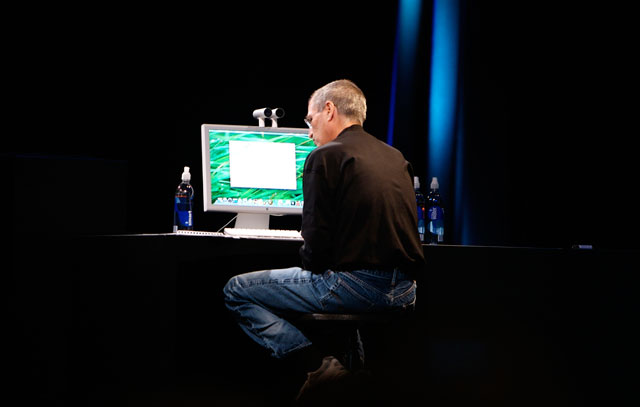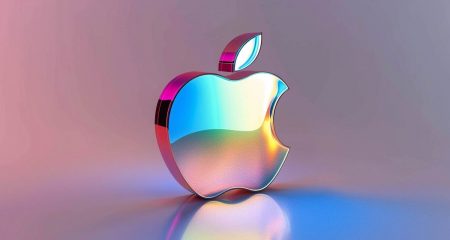
Ashton Kutcher, in the titular role of Jobs, promises at a pivotal moment of the movie to “make Apple cool again”. His dull, functional biographical picture about the late Apple founder and CEO, however, is about as cool as a Dell Latitude. It ticks off a list of features, but there isn’t much art or design to be found in its making.
From its opening frames, Jobs is cringe worthy. We first encounter Kutcher as Jobs in the familiar polo neck shirt and rimless glasses introducing the iPod to an audience of young thralls with keen, glassy eyes. Thanks to Steve and his “tool for the heart” (the film uses that phrase without a trace of irony), we learn we’ll never again need to worry about the first-world problem of not having thousands of songs with us wherever we go.
Just as the score seems set to soar into the chorus of Handel’s Messiah, Jobs snaps back to Steve’s wayward college years and his founding of Apple Computer with Steve Wozniak (Josh Gad, giving the film its heart and conscience with a warm, dry performance). From there, we’re treated to perfunctory rundowns of the creation of the Apple II and Macintosh, Jobs’s ouster from the company in 1985, and his triumphant return to Apple in 1996.

That’s a lot of ground to cover in a two-hour film, and Jobs rushes over it all rather breathlessly. The clumsily structured movie alternates scenes of Steve the Douchebag screwing colleagues out of stock options, railing at board members and backers, and mistreating girlfriends with pandering sketches of Steve the Visionary delivering the catechisms of his design philosophy to rapt, applauding audiences.
There’s a dissonance in Jobs between the tech Zen guru and the insensitive tyrant that the film fails to reconcile. It’s admirable that Jobs doesn’t steer away from the cruel, bullying aspects of its subject’s personality. But glib repetition of the familiar catchphrases — “I want to put a dent in the universe” — isn’t enough to illuminate the links between Jobs’s legendary creativity, perfectionism and prickliness.
There is no context about anything else happening in the computer industry and no insight into how Jobs’s years in the wilderness at Next prepared him to take back his kingdom at Apple. The film grabs at narrative threads — Jobs’s abandonment of his first child, a feud with Bill Gates, his battle for control of Apple’s board — and has no idea where to take them. Carelessly strung together and superficial, Jobs has nothing original to say about the man and his impact on the tech industry.
Kutcher has enough of a surface resemblance to Jobs to pull off a reasonable impression of the man. He has clearly spent enough hours studying Steve Jobs keynotes on YouTube to mimic the man’s stooped gait and messianic mannerisms. But it’s a performance that never gets beneath Jobs’s skin or the mythos that surrounds the man. And when he’s doing sweary, shouty Steve, Kutcher overacts.
The main culprits for Jobs would appear to be director Joshua Michael Stern — who has a pedestrian filmography — and first-time scriptwriter Matt Whiteley. The film isn’t terrible — production values are high and supporting acting is strong — but it commits the worse sin of being boring. One suspects that Jobs would unleash a torrent of abuse on those responsible and fire them all if he was the producer.
Films about the tech industry, its personalities, and their conflicts can make for riveting viewing. Indie Game: The Movie, for example, is a documentary that engages sympathy for difficult, misanthropic games makers and their struggles. And the made-for-TV 1999 film Pirates of Silicon Valley offers a more entertaining look at the first half of Jobs’s career.
Jobs trailer (via YouTube):
But the unavoidable comparison is with David Fincher’s movie about the founding of Facebook, The Social Network. This picture is loose with the history — unlike Jobs, it doesn’t pretend to be a 100% accurate account of the facts — but the insights it offers are trenchant and the writing is so sharp that it stings.
The Social Network found throat-constricting tension, high drama, and cynical humour in dorm room coding and boardroom battles. The good news is that The Social Network’s scribe, Aaron Sorkin, is also writing a Steve Jobs movie. As is usually the case with Apple, the second-generation Jobs movie is probably the one to go for. — (c) 2013 NewsCentral Media
Read more:
- Early Apple Employees Talk Memories of Steve Jobs, New Movie
- Who got slighted in the Steve Jobs movie
- Jobs opens in South Africa on 18 October




